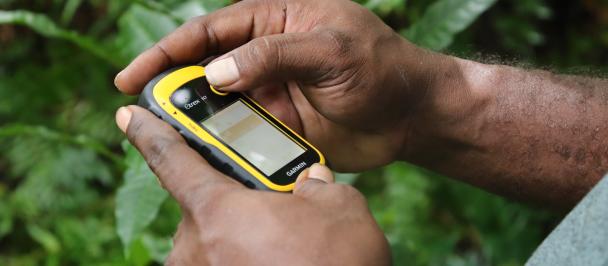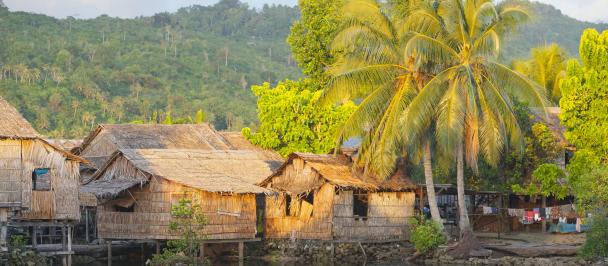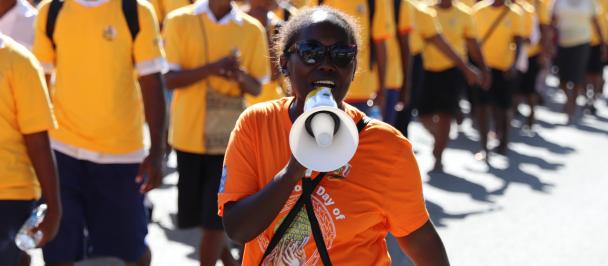Dr Mayleen Ekiek from the Federated States of Micronesia takes part in a training webinar as part of a health care worker capacity-building initiative implemented by UNDP.
A new initiative led by the United Nations Development Programme (UNDP) is bringing digital transformation to training and clinical support for front-line health personnel providing care for people living with HIV in the Pacific islands.
The initiative, which began in mid-2019, employs innovative, digital technologies to build the knowledge and skills, as well as to provide quick-response clinical support and mentoring services for doctors, nurses and health care workers working within 11 supported countries: Cook Islands, Federated States of Micronesia, Kiribati, Nauru, Niue, Palau, Republic of the Marshall Islands, Samoa, Tonga, Tuvalu and Vanuatu. It is being led by Dr. Catherine O’Connor, an Australia-based HIV and sexually transmitted infections (STI) specialist.
“The doctors and nurses in many of these small island countries are often general practitioners, by necessity, without specific expertise in treating and providing care for people with HIV,” Dr. O’Connor explains.
Through the initiative, health care workers in the Pacific, including those in hard to reach, remote islands, are gaining access to highly specialized knowledge and education on a regular basis, which translates into improved care and health outcomes for their clients.
The approach being employed is multi-faceted. One of the most impactful aspects is the provision of on-demand telemedicine support provided by Dr. O’Connor using communication technologies such as Zoom and WhatsApp.
“If doctors or nurses in the countries need support with a specifically challenging case, they are able to reach out to the service and get on a call for support within 24 hours,” says Dr. O’Connor. “If the situation calls for it, we’ve brought in other specialists, including HIV pediatricians to provide advice on managing children with HIV, and also TB specialists for cases of co-infections. We try to be as flexible as possible and to be supportive.”
“The telemedicine service and expertise that has been provided has been invaluable to the clinical management of our patients,” explains Dr. Minado Paul from Vila Hospital in Vanuatu, a recipient of the telemedicine support. “Responses to queries are prompt, advice is offered accordingly and we’re also linked with appropriate sub-specialists relevant to the care of our patients.”
According to Mr. Praneel Maharaj, a specialist in HIV and TB at UNDP, the rapid responses are proving to be critically important for people living with HIV adhering to their treatment. “In the past we’ve seen that when people experience side effects from their medication, and proper assessment and management is not done, that is when they are likely to go off treatment. We’re now seeing that once people go on treatment, they are staying on it – and we can attribute that to this ongoing telemedicine support service, which has strengthened the ability of health workers to properly manage adverse reactions to antiretroviral treatment.”
“We are improving not just the capacity level of health care workers, but we are also improving the lives of people with HIV by providing this additional health care support that was not available before,” says Praneel.
Another component of the training for health care workers involves monthly webinars on topics such as the stages of HIV disease management, antiretroviral treatment, HIV testing and working with key populations, and specific information on management of HIV in children and adolescents.
More in-depth workshops which take place over several days are also organized for the core country teams. These are customized to the identified needs of the country and often feature expert guest speakers.
“Based on the webinar series, we’ve been able to get a fairly good idea of what each country is interested to learn more about and what their particular needs are,” says Dr. O’Connor. “For example, in Samoa at the moment, there are a lot of syphilis cases, so we decided that we would devote a whole day of a recent two-day training to this issue. It can really be tailored to the needs of the country.”
Going forward, there is an increasing emphasis on ensuring the enhanced knowledge and skills translate into sustained high quality HIV treatment, care and support services within the individual Pacific island countries and across the region.
“We’ve tried very hard the past couple of years to develop a base of knowledge across the whole country team, so that if one person were to leave, there is still a lot of skill and expertise within the team,” says Dr. O’Connor. “I’m actually really hopeful that the skill space is increasing very significantly, so that we will have in-country doctors that can fill that support and mentoring role in the future, not just in-country but also regionally.”
The digital health care worker capacity-building initiative is implemented through the Multi-Country Western Pacific Integrated HIV/TB Programme, which is supported from the Global Fund. The programme has been led by UNDP since 2015 and strengthens health systems and control of HIV and TB in 11 Pacific island countries, with a focus on key and vulnerable populations.

 Locations
Locations




